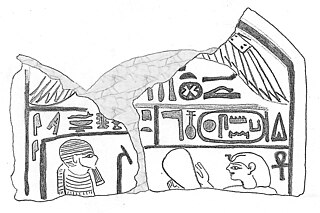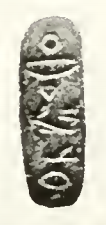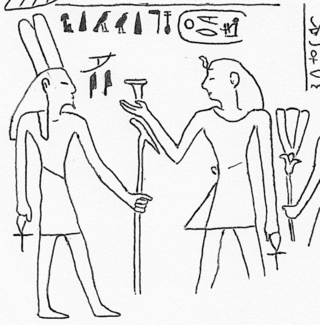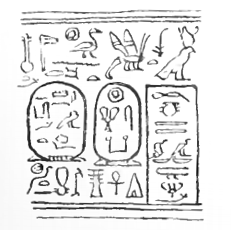
Merneferre Ay was an ancient Egyptian pharaoh of the mid 13th Dynasty. The longest reigning pharaoh of the 13th Dynasty, he ruled a likely fragmented Egypt for over 23 years in the early to mid 17th century BC. A pyramidion bearing his name shows that he possibly completed a pyramid, probably located in the necropolis of Memphis.

Merhotepre Sobekhotep was an Egyptian king of the late 13th Dynasty during the Second Intermediate Period.

Sekhemkare Amenemhat V was an Egyptian pharaoh of the early 13th Dynasty during the Second Intermediate Period.

Semenkare Nebnuni is a poorly attested pharaoh of the early 13th Dynasty during the Second Intermediate Period. He is mainly known for his position in the Turin King List.

Nebmaatre is the prenomen of a poorly attested ruler of the late Second Intermediate Period of Ancient Egypt. Nebmaatre may have been a member of the early 17th Dynasty and as such would have reigned over the Theban region. Alternatively, Jürgen von Beckerath believes that Nebmaatre was a ruler of the late 16th Dynasty.

Merhotepre Ini was a minor king in Ancient Egypt, thought to be the successor of Merneferre Ay in the late Thirteenth Dynasty of Egypt. The Turin King List may assigned him a brief reign of 2 Years, 3 or 4 Months and 9 days.
Sankhenre Sewadjtu was the thirty-fourth pharaoh of the Thirteenth Dynasty of Egypt during the Second Intermediate Period. Sewadjtu reigned from Memphis, starting in 1675 BC and for a period of 3 years and 2 to 4 months.
Sewadjkare was an Egyptian pharaoh of the 13th Dynasty during the early Second Intermediate Period.

Khahotepre Sobekhotep VI was an Egyptian king of the late 13th Dynasty during the Second Intermediate Period.
Nedjemibre was an ephemeral Egyptian pharaoh of the 13th Dynasty of Egypt during the Second Intermediate Period reigning c. 1780 BC or 1736 BC.

Merdjefare was an ancient Egyptian pharaoh of the 14th Dynasty of Egypt during the Second Intermediate Period c. 1700 BC. As a king of the 14th Dynasty, Merdjefare would have reigned from Avaris over the eastern Nile Delta and possibly over the western Delta as well.

Seankhenre Mentuhotepi was an ancient Egyptian pharaoh during the fragmented Second Intermediate Period. According to egyptologists Kim Ryholt and Darrell Baker, he was the fifth king of the 16th Dynasty reigning over the Theban region in Upper Egypt. Alternatively, Jürgen von Beckerath sees him as the fifth king of the 17th Dynasty.

Mersekhemre Ined was a pharaoh of the late 13th Dynasty, possibly the thirty-fifth king of this dynasty. As such he would have reigned from Memphis over Middle and Upper Egypt for a short time either during the early or mid-17th century, from 1672 until 1669 BC or from 1651 until 1648 BC. He may be the same king as Mersekhemre Neferhotep II.

Mershepsesre Ini was a pharaoh of the late 13th Dynasty, possibly the forty-sixth king of this dynasty. He reigned over Upper Egypt during the mid-17th century BC.

Sekhemkare Amenemhat Senebef was an Egyptian pharaoh of the early 13th Dynasty, often considered as the final part of the late Middle Kingdom or early Second Intermediate Period.

Wazad was an Egyptian pharaoh during the Second Intermediate Period. According to the Egyptologists Kim Ryholt and Darrell Baker, Wazad was a member of the 14th Dynasty of Egypt reigning c. 1700 BC. As a king of the 14th Dynasty, he would have reigned from Avaris over the eastern Nile Delta and possibly over the western Delta as well. The Memphis-based 13th Dynasty reigned over Middle and Upper Egypt at the same time. Alternatively, according to Jürgen von Beckerath and Wolfgang Helck, Wazad was a ruler of the 16th Dynasty and a vassal of the Hyksos 15th Dynasty. This view is debated in Egyptology, in particular because Ryholt and others have argued that the 16th Dynasty was an independent Theban kingdom rather than a vassal dynasty of the Hyksos.

Sekhemrekhutawy Khabaw was an Egyptian pharaoh of the early 13th Dynasty during the Second Intermediate Period.
Sewadjkare III was an Egyptian pharaoh of the Fourteenth Dynasty of Egypt during the Second Intermediate Period c. 1700 BC. As a king of the 14th Dynasty, Sewadjkare III would have reigned from Avaris over the eastern Nile Delta and possibly over the western Delta as well.

Merkheperre was an Egyptian pharaoh of the late 13th Dynasty of Egypt during the Second Intermediate Period reigning some time between 1663 BC and 1649 BC. As such, Merkheperre would have reigned either over Upper Egypt from Thebes or over Middle and Upper Egypt from Memphis. At the time, the Eastern Nile Delta was under the domination of the 14th Dynasty.
Sehebre was a ruler of the Fourteenth Dynasty of Egypt, ruling for three to four years around 1700 BC during the Second Intermediate Period. According to Egyptologists Kim Ryholt, Jürgen von Beckerath, and Darrell Baker, he was the fifth king of the dynasty. As such he would have ruled over the eastern Nile Delta – and possibly over the western Delta as well – from his capital at Avaris.















